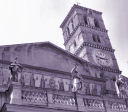He says, "The collection is also, in way, a complement to the Life.
Three translations of this one Soliloquy affords an enriching relish of generations of English.
The word, INCOMPREHENSIBLE, shares significantly in the exclamation spirit in the three columns below.
"Thou art almighty; Thy works are incomprehensible. Grant, then, Lord, that Thy words may never be absent from my thoughts."
EXCLAMATIONS OF SOUL TO GOD
Thanksgiving after Communion - Wikipedia, the free encyclopedia
en.wikipedia.org/wiki/Thanksgiving_after_CommunionShare
... spiritual practice among Christians who believe in the Real Presence of Jesus Christin the ... Jesus Christ, the founder of Christianity, said in the Bible that whoever receives... St. Teresa of Ávila urged her daughters not to rush out after Mass but to ... with Jesus," she said, "and not waste the hour that follows Communion.
From the writings of Saint Teresa of Jesus (Collected Works Institute of Carmeite Studies, Washington. D.C.1987, Soliloquy 8, pp. 450-451)
|
The Complete Works Of Saint Teresa Of Jesus by E. Allison Peers Volume II (1946)
EXCLAMATIONS OF SOUL TO GOD
|
Minot Works of St. Teresa, Exclamations, trans. By Stanbrook
Benedictines, Edit Benedict Zimmerman.
|
We are your handiwork
O Lord, my God, how you possess the words of eternal life,*Jn. 6:67-68, where all mortals will find what they desire if they want to seek it! But what a strange thing, my God, that we forget your words in the madness and sickness our evil deeds cause! O my God, God, God, author of all creation! And what is creation if you, Lord, should desire to create more? You are almighty; your works are incomprehensible. *Rm. 11:33;Jb. 9:10. Bring it about, then, Lord, that my thoughts not withdraw from your words.
2. You say: Come to me, all who labour and are burdened, for I will comfort you.*Mt. 11:28 What more do we want, Lord? What are we asking for? What do we seek? Why are those in the world so unhappy if not because of seeking rest: God, help me! Oh, God, help me! What is this, Lord? Oh, what a pity! Oh, what great blindness that we seek rest where it is impossible to find it! Have mercy, creator, on these your creatures. Behold, we do not understand or know what we desire, nor how we obtain what we ask for. Lord, give us light; behold, the need is greater than with the man born blind, for he wanted to see the light and could not.*4 Now, Lord, there is no desire to see. Oh, how incurable an illness! Here, my God, is where your power must be demonstrated; here, your mercy.
3. Oh, what a difficult thing I ask you, my true God: that you love someone who does not love you, that you open to one who does not knock, that you give health to one who likes to be sick and goes about looking for sickness. You say, my Lord, that you come to seek sinners;*Pr. 8:17; Mt. 7:7; 9:13, these, Lord, are real sinners. Do not look at our blindness, my God, but at all the blood your Son shed for us. Let your mercy shine upon evil that has so increased; behold, Lord, we are your handiwork. May your goodness and mercy help us.
|
VIII
O Lord, my God, Thou hast indeed the words of life, *2 wherein, if we will seek it, we mortals shall all find what we desire. But what wonder is it, my God, that we should forget Thy words when our evil deeds have made us so infirm and foolish? O my God! God, God the Maker of all things created! And yet what are all things created, Lord, if Thou shouldst be pleased to create more? Thou art almighty; Thy works are incomprehensible. *3 Grant, then, Lord, that Thy words may never be absent from my thoughts.
Thou sayest: "Come to Me, all you that labour and are burdened: and I will comfort you." *4 What more do we want, Lord? What do we ask for? What do we seek? Why are worldly people lost if not because they are seeking repose? O God! O God! What is this, Lord? How sad a pity! How blind of us to seek repose where it cannot possibly be found! Have mercy, Creator, on these Thy creatures. Reflect that we do not understand ourselves, or know what we desire, nor are we able to ask as we should. Give us light, Lord. Behold, we need it more than the man who was blind from his birth," for he wished to see the light and could not, whereas nowadays, Lord, no one wishes to see it. Oh, what a hopeless ill is this! Here, my God, must be manifested Thy power and Thy mercy.
Ah, how hard a thing am I asking of Thee, my true God! I ask Thee to love one who loves Thee not, to open to one who has not called upon Thee *5 to give health to one who prefers to be sick and who even goes about in search of sickness. Thou sayest, my Lord, that Thou comest to seek sinners; these, Lord, are the true sinners. Look not upon our blindness, my God, but upon all the blood that was shed for us by Thy Son. Let Thy mercy shine out amid such tremendous wickedness. Behold, Lord, we are the works of Thy hands *6. Help us by Thy goodness and mercy.
1 St. Luke i, 46.
2 [St. John vi, 69].
3 Job ix, la.
4 St. Matthew xi, 28 [D.V. has "refresh," but the Spanish is consolaT]'
5 St. John ix, 1.
6 ... St Mt. vii, 7.
|
EXCLAMATION VIII.
1. O Lord my God, truly " Thou hast the words of
life," *l wherein men can find all they crave, if they but
seek it ! But what wonder is it if we forget Thy words,
seeing the state of folly and disorder to which our sins
have reduced us ?
2. O my God ! God ! God and Maker of all Creation !
What is all this creation compared with what Thou canst
create, dost Thou but will ? Thou art omnipotent : Thy
works are incomprehensible. *2 Permit not Thy words
ever to become effaced from my mind : " Come unto Me
all you that labour and I will refresh you." ' What more
can we desire or seek, Lord ? Why are worldlings lost,
save through seeking happiness ?
3. Good God ! Good God ! How is it, Lord ? How
pitiful ! What utter blindness to seek for happiness
where it cannot be found. Have pity, Creator, on Thy
creatures ! Remember, we do not understand ourselves,
or know what we want, nor do we ask aright ! Lord, give
us light ! See ! we need it more than did the man who
was born blind, for he longed to see the light but could
not, while we do not wish to see it.
1 St. John vi. 69 : Domine, ad quern ibimus ? verba vitcB ceternce
habes.
2 Job ix. 10 : Qui facit magna et incomprehensibilia.
3 St. Matt. xi. 28 : Venite ad me omnes qui laboratis et onerati estis, et ego reficiam vos.
4. Oh ! ill past remedy, needing Thee to manifest both
Thy power and Thy mercy. O true God of mine ! How
hard a thing I crave of Thee ! No less than that Thou
shouldst love those who love not Thee : shouldst open to
those who do not knock — shouldst cure those who wish
to ail, and who foster their maladies.
5. Thou didst declare, my Master, that Thou earnest
to seek sinners : *4 these are the real sinners ! Look not
on our blindness, my God, but on the streams of blood
shed by Thy Son for us. Let Thy mercy shine forth
amidst such monstrous wickedness. Remember, Lord,
we are " the work of Thy hands; *6 " succour us by Thy
goodness and mercy !
|




 was also the site of key ecclesiastical moments in the Church's history, Good said, explaining that a conclave was held in the church. "When the popes came back from Avignon in 1378 Saint John Lateran had been burnt to the ground twice in 55 years. They came here because this church was still standing. You had some very important ecclesiastics in this church."
was also the site of key ecclesiastical moments in the Church's history, Good said, explaining that a conclave was held in the church. "When the popes came back from Avignon in 1378 Saint John Lateran had been burnt to the ground twice in 55 years. They came here because this church was still standing. You had some very important ecclesiastics in this church."
 "Of all the people I have known with a true devotion and particular veneration for St. Joseph, not one has failed to advance in virtue; he helps those who turn to him to make real progress. For several years now, I believe, I have always made some request to him on his feast day, and it was always been granted; and when my request is not quite what it ought to be, he puts it right for my greater benefit."—
"Of all the people I have known with a true devotion and particular veneration for St. Joseph, not one has failed to advance in virtue; he helps those who turn to him to make real progress. For several years now, I believe, I have always made some request to him on his feast day, and it was always been granted; and when my request is not quite what it ought to be, he puts it right for my greater benefit."— 
+b&c.jpg)


